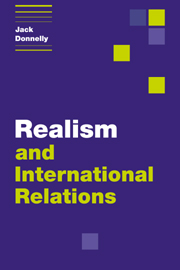Book contents
- Frontmatter
- Contents
- Acknowledgments
- Introduction
- 1 The realist tradition
- 2 Human nature and state motivation
- 3 Anarchy, hierarchy, and order
- 4 System, structure, and balance of power
- 5 Institutions and international society
- 6 Morality and foreign policy
- Conclusion: The nature and contribution of realism
- Selected recommended readings
- References
- Index
3 - Anarchy, hierarchy, and order
Published online by Cambridge University Press: 04 December 2009
- Frontmatter
- Contents
- Acknowledgments
- Introduction
- 1 The realist tradition
- 2 Human nature and state motivation
- 3 Anarchy, hierarchy, and order
- 4 System, structure, and balance of power
- 5 Institutions and international society
- 6 Morality and foreign policy
- Conclusion: The nature and contribution of realism
- Selected recommended readings
- References
- Index
Summary
Anarchy, the absence of hierarchical relations of authority and rule, largely defines the discipline of international studies. Students of comparative politics study hierarchical political orders, societies that operate under established systems of law and government. Students of international relations study the anarchic interactions of polities that recognize no higher political authority. This stylized picture, like any good caricature, highlights essential features of its subject. I will argue, however, that realist accounts of the meaning and implications of anarchy are of severely limited applicability and value.
Anarchy, chaos, and order
The term “anarchy” comes to us from the Greek, meaning, literally, absence of government or rule (arche). Arche is the term Thucydides uses to refer to the Athenian “empire”; rule of one city over another, in contrast to both the formal equality of alliances and the hegemonic leadership of the first among equals. It is most familiar to us today in common (Greek-derived) definitions of regime types such as monarchy (rule of one) and oligarchy (rule of the few).
In popular discourse, “anarchy” often suggests chaos or violent disorder. But the absence of hierarchical order need not lead to a Hobbesian war of all against all. Individuals and social groups often order and organize themselves in the absence of government. Most realists thus admit the obvious fact that international relations reveals significant elements of order.
Order in international society, however, is established “horizontally” rather than “vertically;” through the interaction of formally equal states rather than being imposed “from above.” For example, sovereign states regularly contract with one another (agree to treaties), reciprocally accepting obligations and giving up elements of their “primordial” liberty (sovereignty).
- Type
- Chapter
- Information
- Realism and International Relations , pp. 81 - 106Publisher: Cambridge University PressPrint publication year: 2000



